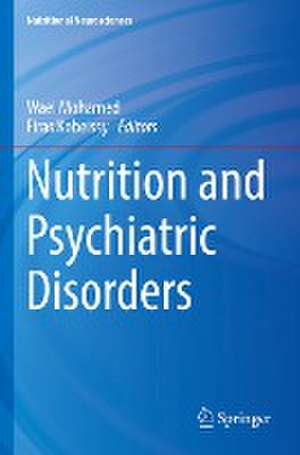Nutrition and Psychiatric Disorders: Nutritional Neurosciences
Editat de Wael Mohamed, Firas Kobeissyen Limba Engleză Paperback – 5 oct 2023
| Toate formatele și edițiile | Preț | Express |
|---|---|---|
| Paperback (1) | 1221.83 lei 6-8 săpt. | |
| Springer Nature Singapore – 5 oct 2023 | 1221.83 lei 6-8 săpt. | |
| Hardback (2) | 1180.55 lei 6-8 săpt. | |
| Springer Nature Singapore – 29 iun 2024 | 1180.55 lei 6-8 săpt. | |
| Springer Nature Singapore – 4 oct 2022 | 1227.99 lei 6-8 săpt. |
Preț: 1221.83 lei
Preț vechi: 1490.03 lei
-18% Nou
Puncte Express: 1833
Preț estimativ în valută:
233.91€ • 244.06$ • 196.08£
233.91€ • 244.06$ • 196.08£
Carte tipărită la comandă
Livrare economică 12-26 martie
Preluare comenzi: 021 569.72.76
Specificații
ISBN-13: 9789811950230
ISBN-10: 9811950237
Ilustrații: XVIII, 383 p. 1 illus.
Dimensiuni: 155 x 235 mm
Greutate: 0.56 kg
Ediția:1st ed. 2022
Editura: Springer Nature Singapore
Colecția Springer
Seria Nutritional Neurosciences
Locul publicării:Singapore, Singapore
ISBN-10: 9811950237
Ilustrații: XVIII, 383 p. 1 illus.
Dimensiuni: 155 x 235 mm
Greutate: 0.56 kg
Ediția:1st ed. 2022
Editura: Springer Nature Singapore
Colecția Springer
Seria Nutritional Neurosciences
Locul publicării:Singapore, Singapore
Cuprins
SECTION I Food, Brain function, and Behavior- Chapter 1: Food and brain development (Ramya Nadig).- Chapter 2: Nutrition and brain functions in Health and Disease (Heba Mansour).- Chapter 3: Nutrition, cognitive functions, and emotions (Rasoul Ghasemi).- Chapter 4: Ketogenic diet: Implications for treatment and injury in neuropsychiatry and motor functioning (fatima dakroub).- Chapter 5: Effects of malnutrition on brain development (Pranshul Sethi).- Chapter 6: Nutrition, neurotransmitters, and behavior (Sumit Srivastav).- Chapter 7: OMICS in Schizophrenia and Alzheimer’s Disease (Sumit Srivastav).- SECTION II Psychiatric disorders related to nutrition: deficiency or overload.- Chapter 8: Effects of Depression and Antidepressant Therapy on Serum Zinc Levels (Samer El Hayek).- Chapter 9: Nutrition and Depression (Ramdas Ransing).- Chapter 10: Nutritional Deficiencies in Obsessive-Compulsive Disorder and Possible Treatment Interventions (Samer El Hayek).- Chapter 11: Caffeine, Mental wellbeing, and Psychiatric Disorders (Ahmed Radwan).- Chapter 12: Biopsychology of chocolate craving (Laura Orsolini).- Chapter13: Food addiction (Samer El Hayek).- Chapter 14: Nutrition and Anxiety disorders (Ramli Musa).- Chapter 15: Nutrition and substance use disorder (Zehra Batool).- Chapter 16: Nutrition and Psychiatric Disorders: Focus on Schizophrenia (Heba Mansour).- Chapter 17: High fat diet and psychiatric disorders: what is the interplay? (Pranshul Sethi).
Notă biografică
Dr. Mohamed is a Psychiatrist Neuroscientist. He earned his medical degree from Menoufia Medical School, Egypt and his research doctorate degree from the Penn State University, USA. Currently, he is an assistant professor in IIUM, Malaysia. He has published widely in the field of Parkinson as well as Alzheimer’s Dementia, with about 120 peer-reviewed journal papers with >800 citations, h-index 32. He authored for Springer, Cambridge, and Elsevier. He is the founder and president of AfrAbia Society (AAS). He has delivered and/or participated in >200 international-level lectures and expert panels. He received many research grants from national and international organizations namely IBRO, ISN, MJF, STDF, FRGS, and INDO-ASEAN with a total research funding of One million US$. He is now an active partner in GP2 consortium (IPDG-Asia).
Dr. Firas Kobeissy is an Associate Professor at the American University of Beirut in the Biochemistry and Molecular Genetics department. Dr. Kobeissy obtained his Ph.D. from the University of Florida in the area of Neuroscience with a focus on brain injury biomarkers. He is a trained neuroscientist with extensive expertise in neurotrauma and drug abuse research utilizing neuroproteomics approaches. His research interest is focused on applications of proteomics related to brain injury models, including closed head injuries and blast injuries. Dr. Kobeissy has authored more than 240 articles, reviews, and book chapters along with two patents. He is the associate director of the Center of Neuroproteomics and Biomarker Research (NNBR) at the McKnight Brain Institute at the University of Florida, Department of Emergency Medicine. He is the current president of the International Brain Research Organization- MENA chapter (2020-2023). He serves as the current president of the International Brain Research Organization (IBRO) MENA Chapter (2020-2023).
Dr. Firas Kobeissy is an Associate Professor at the American University of Beirut in the Biochemistry and Molecular Genetics department. Dr. Kobeissy obtained his Ph.D. from the University of Florida in the area of Neuroscience with a focus on brain injury biomarkers. He is a trained neuroscientist with extensive expertise in neurotrauma and drug abuse research utilizing neuroproteomics approaches. His research interest is focused on applications of proteomics related to brain injury models, including closed head injuries and blast injuries. Dr. Kobeissy has authored more than 240 articles, reviews, and book chapters along with two patents. He is the associate director of the Center of Neuroproteomics and Biomarker Research (NNBR) at the McKnight Brain Institute at the University of Florida, Department of Emergency Medicine. He is the current president of the International Brain Research Organization- MENA chapter (2020-2023). He serves as the current president of the International Brain Research Organization (IBRO) MENA Chapter (2020-2023).
Textul de pe ultima copertă
The book comprehensively reviews the role of nutrition in psychiatric disorders. It provides mechanistic insights into the effects of nutrition on metabolic pathways, mitochondrial nutrients, neurodegeneration and CNS disorders, cell signaling, and neuronal functions. The book further highlights the role of diet in preventing and treating mental health and modifying drug treatment effects. Further, it explores the relationship between nutrition and psychiatric disorders, including depression, autism, anxiety, Attention-Deficit / Hyperactivity Disorder, and OCD. The book further explores the recent advancements in understanding the important role of nutrients as therapeutics in various psychiatric disorders. Lastly, it presents an overview of nutrients as neuroprotective agents along with the main principles of nutrigenomics. The book is essential reading for neuroscientists interested interest in food therapeutic strategies.
Caracteristici
Reviews the role of nutrition in the management of psychiatric illnesses Discusses nutritional therapy for treatment of psychiatric disorders Highlights the effects of the diet on brain neurotransmitters











